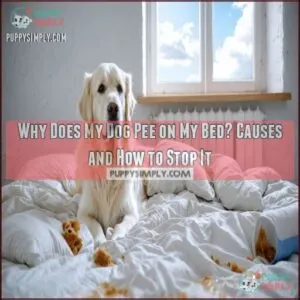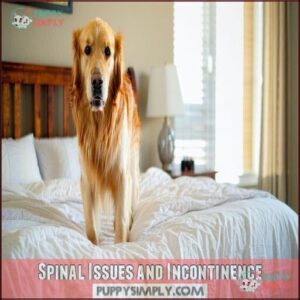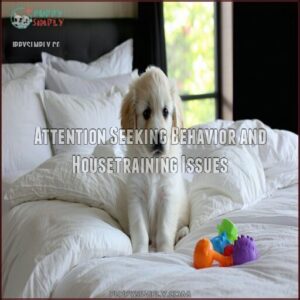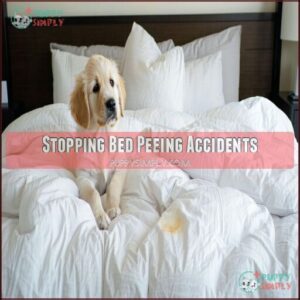This site is supported by our readers. We may earn a commission, at no cost to you, if you purchase through links.
 If your dog pees on your bed, it’s usually a sign of something deeper going on.
If your dog pees on your bed, it’s usually a sign of something deeper going on.
It might be a urinary tract infection, incontinence, or even stress causing the behavior. Dogs can also pee on beds because they feel insecure, anxious, or are marking their territory.
Sometimes, it’s a simple case of housetraining slipping through the cracks. Medical issues like kidney disease or hormonal imbalances could also be at play.
It’s not about defiance—it’s about your dog trying to communicate. Rule out health problems first, then focus on training and creating a calm, predictable routine. Solving this takes patience and care.
Table Of Contents
- Key Takeaways
- Dog Bed Peeing Reasons
- Why Dogs Pee on Beds
- Medical Causes Explained
- Behavioral Factors Involved
- Stopping Bed Peeing Accidents
- Frequently Asked Questions (FAQs)
- Why does my dog pee on the bed?
- How to identify the reasons why my dog is peeing on the bed?
- Why does my dog urinate so much?
- Why do people pee on the bed?
- What does it mean when my dog peed on my bed?
- Should I punish my dog for peeing in my bed?
- How do I protect my bed from dog urine?
- How can I get my dog to stop peeing on my bed?
- Why does my dog pee on my stuff?
- Why does my dog keep peeing on the furniture?
- Conclusion
Key Takeaways
- Rule out health issues first, like UTIs, incontinence, or kidney disease, by consulting your vet.
- Your dog might pee on your bed due to stress, anxiety, or territorial marking, so focus on creating a calm and predictable environment.
- Avoid punishment and use positive reinforcement to teach better potty habits and build trust.
- Clean accidents thoroughly with enzymatic cleaners to prevent your bed from becoming a repeat target.
Dog Bed Peeing Reasons
If your dog pees on your bed, it’s often a signal of underlying medical or behavioral issues.
From urinary tract infections to anxiety, understanding the cause is key to addressing the problem.
Urinary Tract Infections
Urinary Tract Infections (UTIs) are common dog health issues that might explain your dog peeing on your bed.
Urinary tract infections could be why your dog pees on the bed—watch for frequent accidents and discomfort.
Caused by bacteria like E. coli, UTI symptoms include frequent urination, discomfort, or accidents.
Diagnostic tests like urinalysis confirm the problem, and antibiotic treatment clears it up.
Preventative measures, such as regular vet checkups, help minimize future medical issues impacting your dog’s health.
UTIs are a known cause of dog urinary incontinence.
Kidney Disease and Diabetes
Kidney problems and diabetes in dogs can cause frequent urination due to serious medical conditions.
Chronic kidney disease stems from prolonged kidney damage, needing consistent hydration and monitoring progress.
Meanwhile, dog diabetes impacts insulin regulation, leading to glucose imbalances and urinary changes.
Proper disease management, including adjusting dietary needs and routine vet visits, guarantees your dog’s comfort while tackling these medical issues, ensuring consistent hydration and addressing glucose imbalances.
Incontinence and Bladder Stones
Bladder stones or incontinence can leave your dog struggling with accidents on your bed.
Stone formation in the urinary tract irritates the bladder, causing pain and frequent urination.
For incontinence causes, age or underlying dog medical conditions play a role.
Treat dog bladder problems with dietary management or surgical options, and provide pain relief to improve your dog’s comfort.
Hormonal Imbalances and Age
Your dog’s age or hormonal changes might play a role in accidents.
Hormone-responsive incontinence, often affecting spayed females or senior males, can cause leaks.
Cognitive decline and prostate issues also contribute to senior dog accidents.
Watch for these signs:
- Female dog incontinence after being spayed.
- Male dog incontinence as they age.
- Increased accidents during sleep.
- Difficulty holding urine indoors, which can be a sign of hormonal changes.
Why Dogs Pee on Beds
A cozy bed can confuse some dogs, leading to accidents.
They might target your bed for its comforting smell, a phenomenon called scent soaking, or because the bed material absorbs odors, encouraging repeats. Owner absence plays a role too—some dogs pee out of anxiety when left alone. Others may experience sleep startle, urinating during sudden wakeups.
Breed predisposition also affects behavior; smaller breeds or those prone to dog incontinence are often implicated.
Here’s a quick breakdown:
Reason Description
Understanding these triggers can help address dog urination problems effectively.
Medical Causes Explained
When your dog pees on your bed, medical issues could be a contributing factor.
Conditions like urinary tract infections, diabetes, or kidney disease often affect bladder control, so a vet check-up is essential.
Urinary Tract Issues and Infections
Urinary tract infections (UTIs) can wreak havoc on your dog’s bladder health.
Watch for UTI symptoms like frequent urination, straining, or accidents on your bed.
To promote proper kidney function and tackle canine urinary system issues:
- Get a urinalysis for accurate diagnosis.
- Treat with infection treatment like antibiotics.
- Monitor for dog cystitis or related problems.
- Consult your vet promptly to address canine urinary system issues.
Kidney Disease and Diabetes Symptoms
When your dog experiences kidney disease or diabetes, you might notice symptoms like excessive thirst, frequent urination, or weight loss.
Excessive thirst and frequent urination could signal kidney disease or diabetes—early vet care ensures your dog stays healthy and comfortable.
These disorders affect their urinary system, leading to accidents even on the bed. Keep a close eye for changes in drinking habits or bathroom behavior.
One key indicator can be increased thirst and urination. Always consult a vet promptly to guarantee your dog’s health isn’t at risk.
Spinal Issues and Incontinence
Some spinal issues, like trauma or chronic degenerative radiculomyelopathy (CDRM), can affect your dog’s bladder control.
These medical causes of urination often lead to bed-wetting due to incontinence.
Pain management and mobility solutions, such as ramps or harnesses, improve senior care and protect your dog’s comfort.
Effective canine urinary incontinence treatment starts with addressing underlying spinal problems through your veterinarian.
Cushing’s Disease and Hormonal Imbalances
Cushing’s disease, often caused by pituitary tumors, leads to excessive cortisol overproduction in dogs.
Symptoms include frequent urination, increased thirst, and hormone-responsive incontinence.
Hormone testing, like urinalysis, is essential for diagnosis.
Medication options and proper disease management can help control these medical causes of urination, preventing complications like dog kidney disease, and improving your dog’s comfort and well-being.
Behavioral Factors Involved
When your dog pees on your bed, behavioral factors like stress, anxiety, or housetraining issues may be at play.
Understanding these triggers can help you address the root cause and guide your dog toward better habits.
Territorial Marking and Anxiety
Territorial marking might be your dog’s way of asserting dominance or claiming their space.
Anxiety triggers, like new people or changes at home, can worsen dog anxiety peeing.
Scent marking is common in intact dogs, but stress reduction, such as maintaining routines or using anti-anxiety tools, helps.
Environmental changes, like removing stressors, reduce territorial marking and calm your dog, which can be achieved through maintaining routines.
Excitement and Fear-Based Urination
Excitement urination happens when arousal incontinence makes it harder for your dog to hold their bladder during greetings or play.
Fear urination, often linked to submissive behaviors, could stem from anxiety triggers like loud voices or scolding.
To manage, avoid punishment, keep interactions calm, and focus on emotional regulation. Helping your dog feel safe reduces accidents on your bed.
Stress and Emotional Distress
Stress and anxiety can trigger accidents like dog stress peeing, especially during separation anxiety or loud noise phobias.
Sudden environmental changes or owner absence might make your dog feel insecure. Trauma impacts their emotional health, causing inappropriate urination.
Watch for dog anxiety triggers, such as new surroundings or disruptions. Identifying these stressors helps you provide comfort and reduce their anxiety.
This approach allows you to address the root cause of the issue, ultimately helping to prevent accidents like dog stress peeing.
Attention Seeking Behavior and Housetraining Issues
Sometimes, a dog peeing the bed stems from attention-seeking or housetraining issues.
Ignoring behavior might unintentionally reinforce it, while inconsistent schedules confuse dogs.
Focus on potty training with a reward system to encourage outdoor elimination.
If dog training issues persist, redirect attention calmly during accidents.
Address dog behavioral issues by creating a consistent schedule and positively reinforcing appropriate bathroom habits.
Consistent rewards and praise are key to successful potty breaks.
Stopping Bed Peeing Accidents
To stop your dog from peeing on your bed, focus on addressing the cause and being consistent with your approach.
Combining proper training, medical care, and a predictable routine will help solve this frustrating issue, by addressing the cause and being consistent.
Training and Consistency
Consistency solves most housetraining issues, including dog peeing bed concerns.
Stick to a potty schedule, rewarding good behavior immediately. Use crate training for boundaries and redirecting behavior when accidents happen.
Consistent commands help avoid house training regression. Timing matters—praise outdoor success right away.
A structured approach to dog’s toilet habits can greatly improve training outcomes. Patience and repetition are key dog training techniques to reinforce where bathroom breaks belong.
Addressing Underlying Medical Issues
If your dog keeps peeing on the bed, medical issues like UTIs, diabetes, or Cushing’s effects could be the reason.
Kidney function problems and spinal issues might also affect urinary control. A veterinarian can diagnose these conditions with blood tests, urinalysis, and imaging.
Treating urinary tract health guarantees your dog’s comfort while reducing accidents. Don’t overlook their health.
Sometimes, the bed-peeing is related to anxiety and stress, especially during loud noises, which can cause significant discomfort and stress.
Creating a Safe and Predictable Environment
A calm environment and predictable schedule help your dog feel secure.
Reduce stressors like noise or sudden changes. Create a safe space, such as a cozy corner with familiar bedding, to ease anxiety.
Stick to a consistent routine for feeding, play, and potty breaks. This builds trust and reduces habits like your dog peeing on your bed.
Dogs may exhibit indoor messes due to anxiety, but lack vengeful motives.
- Reduce Stressors: Minimize changes in the home.
- Safe Space: Use a crate or quiet area to provide security.
- Consistent Routine: Keep mealtimes, walks, and bathroom breaks orderly.
- Calm Environment: Avoid loud music, yelling, or sudden surprises.
- Predictable Schedule: Structure every day for stability and reassurance.
Positive Reinforcement Techniques and Rewarding Good Behavior
Positive reinforcement training works wonders by encouraging your dog to form good habits.
Use dog training rewards like treats or praise to create positive associations with outdoor urination.
Avoid dog training punishment—redirecting behavior gently builds trust.
Create a consistent dog training environment, communicate clearly, and repeat dog outdoor urination rewards regularly.
These rewards often include palatable training incentives.
Patience training guarantees progress, fostering better habits over time.
Frequently Asked Questions (FAQs)
Why does my dog pee on the bed?
Your dog might pee on the bed due to stress, medical issues like a UTI, or marking behavior.
It’s essential to rule out health problems with a vet and evaluate emotional triggers or training gaps, considering medical issues is crucial for an accurate diagnosis.
How to identify the reasons why my dog is peeing on the bed?
Imagine this scenario: your bed becomes their favorite bathroom.
Start with a vet check to rule out health issues, then observe patterns—stress, marking, or excitement may be at play.
Understanding triggers reveals customized solutions.
Why does my dog urinate so much?
Your dog might be urinating frequently due to a urinary tract infection, diabetes, or other medical issues.
Stress, excitement, or marking behaviors could also be causes.
A vet visit can pinpoint the exact reason, which is critical to understanding the issue.
Why do people pee on the bed?
Bedwetting in people often stems from medical issues like urinary tract infections, overactive bladder, or conditions like diabetes.
Stress, deep sleep cycles, or neurological disorders can also contribute.
Consult a doctor if it persists.
What does it mean when my dog peed on my bed?
Your dog may pee on your bed due to medical issues like UTIs or incontinence.
It’s essential to rule out health problems with a vet and address training or stress triggers.
Should I punish my dog for peeing in my bed?
Don’t punish your dog for peeing on your bed—it can increase anxiety, making the issue worse.
Instead, focus on identifying the cause, whether medical or behavioral, and use positive reinforcement to guide better habits.
How do I protect my bed from dog urine?
Protect your bed by using waterproof mattress covers, washable blankets, or pet-proof bedding.
Limit access when unsupervised with gates or closed doors.
Add a designated sleeping spot nearby to redirect your dog’s comfort-seeking behavior.
How can I get my dog to stop peeing on my bed?
Start by ruling out medical issues with your vet.
Limit bed access, use consistent potty training, and clean thoroughly with enzymatic cleaners.
Reward correct behavior outside, address anxiety triggers, and reinforce good habits gently over time.
Why does my dog pee on my stuff?
Your dog might pee on your stuff because of stress, anxiety, territorial marking, or medical issues like a UTI.
Identifying triggers, cleaning thoroughly with enzymatic cleaners, and addressing underlying causes can help resolve this behavior.
Why does my dog keep peeing on the furniture?
Frequent urination on furniture can result from stress, marking behavior, or medical issues like urinary tract infections.
Check with your vet to rule out health problems, then focus on training and addressing environmental triggers.
Conclusion
Why does your dog pee on your bed? It’s often their way of signaling discomfort, whether it’s medical, emotional, or behavioral.
Start by ruling out health issues like infections or incontinence with your vet. Then focus on consistent training, calming strategies, and creating a secure environment.
Be patient and use positive reinforcement to encourage better habits. With time, understanding, and care, you’ll help your dog—and your bed—stay dry and stress-free.
- https://doggielawn.com/pages/how-it-works
- https://www.sciencedirect.com/science/article/pii/S0378113519311605
- https://vcahospitals.com/know-your-pet/urinary-tract-infections-utis-in-dogs
- https://www.merckvetmanual.com/endocrine-system/the-pancreas/diabetes-mellitus-in-dogs-and-cats?query=diabetes
- https://www.akc.org/expert-advice/training/dog-pees-on-bed/

















